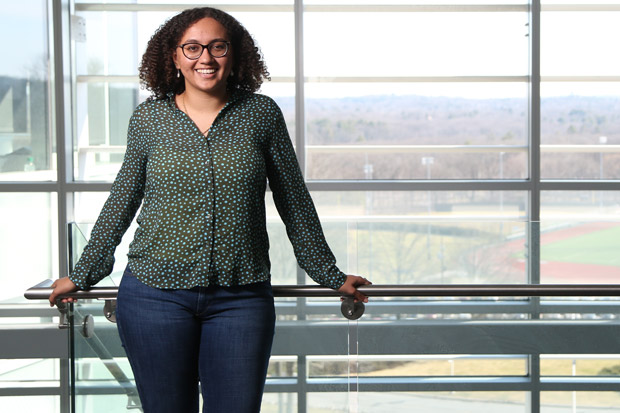The Brandeis Scientific Method
 Photo/Mike Lovett
Photo/Mike LovettSarah Magda Zainelabdin ’18
In the months before she came to Brandeis, Sarah Magda Zainelabdin ’18 worried if she would fit in. She grew up on Staten Island in New York City. Her mother came from Romania and worked as a nurse, and her father, a Muslim born in Sudan, drove a truck. She knew her background was different from many of her classmates.
Her fears of feeling like an outsider were soon put to rest. Over the summer before school started, Zainelabdin attended a science immersion “boot camp” at Brandeis for a cohort of students, like her, who had an interest in the sciences. The students were all part of the Brandeis Science Posse program, which offers full-tuition scholarships each year to 10 outstanding students from urban areas interested in studying the sciences. Boot camp focused on academics, but afterwards there was a retreat. “It was like summer camp,” Zainelabdin says. “We did a lot of trust-building exercises and team building.”
The friendships she developed have endured. Feelings of not belonging have never been an issue. “I’ve always had a group of people to turn to,” Zainelabdin says. She was also assigned a graduate student mentor who was also a person of color.
Zainelabdin has taken full advantage of the wide range of activities Brandeis offers. Since she was a first-year, she has worked in the lab of biology professor Liz Hedstrom. Working alongside graduate students and postdoctoral fellows, she’s investigating how cruciferous vegetables like cauliflower, cabbage and broccoli can prevent cancer. She also landed a $5,250 grant from Brandeis’ Research Experiences for Undergraduates Program in Cell and Molecular Visualization to spend a summer working in the lab, funded by the National Science Foundation. “I’ve even been doing my own experiments,” she says.
Last year, she joined a contingent of Brandeis students who spent spring break in Honduras helping to build a makeshift health clinic in the western part of the country. “There are so many opportunities for students here,” she says. “And because it’s a small school, there’s less competition to get them.”
Brandeis encourages students to take an interdisciplinary approach to their studies. In Zainelabdin’s case, this has meant pursuing her interest in anthropology alongside her premed studies. She’s found more commonality between her classes than she anticipated. Anthropology’s emphasis on understanding other cultures, she says, will enable her to be a better doctor. “Healthcare requires both a knowledge of biology and chemistry and also an understanding of the sensibility and viewpoints of the people you are interacting with,” she says.
Like many Brandeisians, Zainelabdin wants to use her knowledge and education to help heal the world. That’s why her long-term plans include medical school and a career in global health.
Categories: General, Student Life





